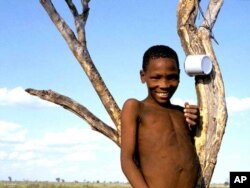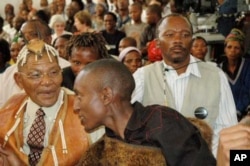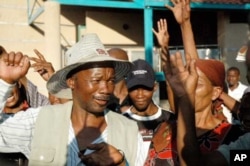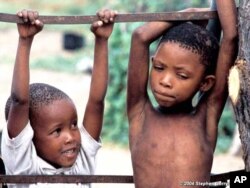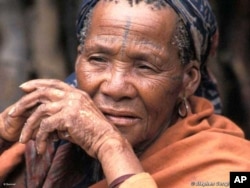This is Part 1 of a 5-part series: Africa's Endangered Peoples
Parts 1 / 2 / 3 / 4 / 5
One hundred thousand Bushmen are spread across southern Africa, with many in Botswana. They’re the indigenous people of the region, having survived the arid environment for thousands of years by hunting animals and gathering wild plants and roots.
In 1961, Botswana’s government established the Central Kalahari Game Reserve [CKGR] to protect the Bushmen’s traditional territory and the country’s game.
But since the 1980s, the authorities have been pressuring the Bushmen to “modernize” and abandon their traditional way of life and to leave their ancestral home in the CKGR.
Diamonds
“The first government noises about having to get the Bushmen out of the reserve came shortly after a very large deposit of diamonds was discovered in the reserve,” says Jonathan Mazower of Survival International, an organization lobbying for the rights of tribal peoples worldwide.
Mazower’s spent a long time working among the people of the reserve. He says, “We and many other observers have long believed that the government’s intention to force the Bushmen out of the reserve was related to the fact that there were rich diamond deposits in the reserve.”
Botswana authorities deny this, saying they merely want the Bushmen to live better by adopting “civilized” ways of life, such as being educated. The authorities insist that humans and animals can’t coexist in harmony because they’re competing for scarce resources.
“This ignores the fact that wild animals and Bushmen have lived in balance together for many, many generations,” says Smith Moeti, who was born in the CKGR.
Forced evictions
In “three big clearances,” in 1997, 2002 and 2005, says Survival International, the government forced almost all Bushmen out of the reserve. According to the NGO, “Their homes were dismantled, their school and health post were closed, their water supply was destroyed and the people were threatened and trucked away.”
The state established three “relocation camps” outside the reserve and “dumped” the Bushmen there, says Mazower. The government argued that the Bushmen had access to better facilities in the camps, like a school and clinic.
But Mazower describes them as “thoroughly depressing” places where the Bushmen were “all squashed on top of one another.” He adds, “The hunting and gathering in the immediate vicinity of the camps soon became exhausted and the Bushmen therefore had no means of feeding themselves. Secondly, there were very few jobs, so people had nothing to do, and entirely predictably … most of the Bushmen turned to drink or violence.”
Since they’ve lived in the camps, HIV-infection rates among the Bushmen have soared.
No water and hunting
In 2002, in an “act of desperation,” says Moeti, the Bushmen took the Botswana government to court to compel it to allow them to return to their land in the reserve.
In 2006, the Bushmen won the case. But their battle was just beginning.
The state immediately argued that the judgment applied only to the 189 Bushmen whose names appeared on the court action. Mazower says, “They made it very difficult for anyone whose name was not on that list to go back (into the reserve); they made it difficult for the children of the people who were on the list to go back, especially the older children.”
The government also prohibited the Bushmen from using a borehole in the park, depriving them of a vital source of water. The authorities maintained the water was for animals only.
Moeti remembers government security forces preventing aid workers from accessing the CKGR to help thirsty Bushmen.
“They actually attempted to go into the reserve to give water to people like my grandmother. But the government made a roadblock to stop people from going into the reserve to rescue people who were dying of thirst,” says Moeti.
His grandmother died while wandering in search of water. The government denies responsibility for any Bushmen deaths.
The authorities also refused to issue permits to the Bushmen to hunt in the park and then arrested a number of them for illegally killing animals.
“Clearly the inference of all this is that the government wanted to make it as difficult as possible for any Bushmen to go back to the reserve and to restrict their numbers as much as they could,” Mazower comments.
So, despite their court victory, and deprived of water and food, the Bushmen had no means of survival in the CKGR. Many began abandoning their traditional home.
Bushmen victorious in new court case
In 2010, however, the Bushmen took further legal action against the Botswana government, demanding access to the borehole in the reserve. In January, the country’s Appeal Court ruled that the Bushmen could use the borehole and also sink new ones in the CKGR. The judges described the Bushmen’s plight as “a harrowing story of human suffering and despair.”
The Botswana government says it will abide by the court ruling. Mazower says, “There have been a few indications that they may be looking at ways to help the Bushmen establish these boreholes, get them working again. If they are actually doing that, that’s an encouraging sign.”
But in the continued absence of water and hunting rights, the Bushmen have yet to move back into the reserve. Mazower says “at least (the state is) not doing anything which seems positively obstructive. So I think at the moment we’re in a bit of a waiting and watching phase to see just what’s going to unfold over the next couple of months.”
Moeti says the Bushmen “just want to leave the camps and be left alone to be self-sufficient, like we’ve always been,” and don’t expect “government charity.” He says, “Obviously we cannot depend on the government providing services to us. Rather, what we concentrate on is for us to find funds to re-commission the borehole.”
Balance the old with the new
Survival International hopes the outcome of the recent court case leads the Botswana government to realize that the Bushmen have the right to decide how and where they want to live.
“Give indigenous peoples the space to adapt their cultures to outside forces in the same way as everyone else’s culture adapts all the time,” says Mazower.
Moeti says his people have “no problem” with “modernizing to a degree” – which includes being formally educated and using health clinics – while at the same time retaining the “basic elements” of their tradition, like hunting and gathering in the CKGR.
“They can feed themselves that way, rather than rely on government handouts in relocation camps,” says Mazower.
Moeti is convinced the Bushmen will be able to balance “civilizing” with their traditional way of life. He, for example, is maintaining his traditions while studying at university in Botswana’s capital, Gaborone.
But “no matter what happens” in the near future, says Moeti, Bushmen like him will “always resist eviction from our natural home, even if there is a high price to pay.”




![A Bushman inside his traditional territory in Botswana’s Central Kalahari Game Reserve [CKGR]](https://gdb.voanews.com/8D23025B-738B-4DC6-9368-A86422EE9594_w250_r0_s.jpg)
